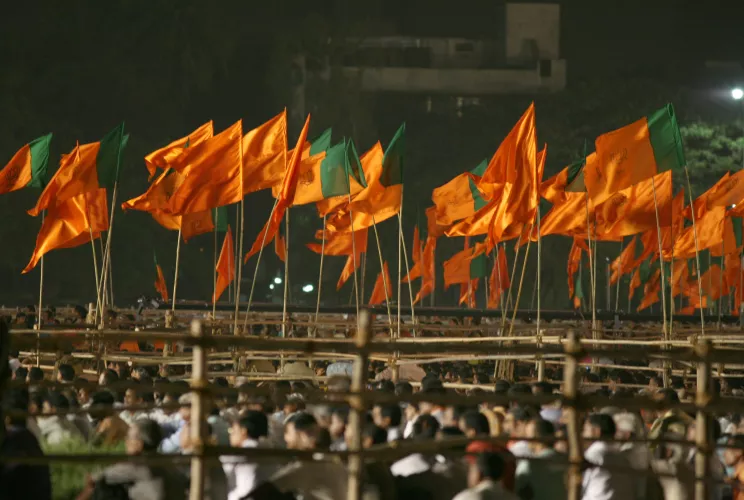Organizing Politics: Religion and Political Parties in Comparative Perspective


The study of religion and political parties represents a relatively understudied subfield of research that has nevertheless recently witnessed a resurgence of scholarly interest given its increasing global significance. Initially focused on the intersection of religious cleavages and party formation in Western democracies in the mid-twentieth century,[1] the field has expanded both in terms of geographic breadth to cover the non-Western world—in part due to the spread of multiparty elections and the rise of party politics around the globe[2]—and in terms of the depth in scope of inquiry to focus beyond the subject of social cleavages to analyze the complexity and multiplicity of forms by which religion and political parties may interact. The recent victories of Islamic political parties in the Middle East as a consequence of the Arab Spring, for example, as was the case with the Freedom and Justice Party (FJP) in Egypt, Ennahda in Tunisia, and the Party of Justice and Development (PJD) in Morocco, underscore the growing significance of the intersection of religion and political parties in shaping the contemporary world. Especially in light of their different political manifestations despite their proclaimed adherence to the same religion, Islam, the rise to power of these parties serves to drive in the need for further research on questions of religion and political parties with regards to areas such as democratization, party platform formation, party moderation and secularization, and social constituency representation and interest articulation.
The renewed focus on religion and political parties, however, occurred much earlier as political events in the 1980s reminded social scientists of the power of religion to influence parties and social movements across different regions of the world. The Iranian revolution depicted how a religious movement could overthrow a regime once seen as the exemplar of secularization in the region and establish a modern religious and revolutionary party, the Islamic Republic Party (IRP), to rule.[3] In the United States, the rise of the Christian Right showed how religious movements can evolve along with political parties,[4] changing both in the process. The role of the Pope and the Catholic church in supporting Solidarity in Poland demonstrated the power of religious groups to mount movements and parties that challenge non-democratic regimes. Moreover, the Church’s more complex role with post-independence political parties in Poland showed that democracy does not simplify the relationships between religious institutions and parties as one may assume.[5]
Like the broader field of religion and politics, the study of religion and political parties had been stunted earlier by the secularization paradigm. Modernization and secularization theories channeled scholarly attention away from religious politics[6] and predicted that the importance of religion on politics would decline—a position that failed to explain the resurgence of religion in many political systems in the world. Although secularization has clearly occurred in many countries,[7] there has been a substantial revival of religion in many parts of the globe.[8] The impact of religion on politics has not declined but rather changed in complex ways,[9] while the separation of religion and state has paradoxically decreased with higher socio-economic development throughout the world.[10]
Yet, the study of religion and political parties, the subject of this chapter, has been a difficult area for inquiry due to the complexity of the interrelationship between the two. Although there are a number of studies of religion and parties in particular nations, there is less comparative analysis on this theme because of the complex variety of relationships in play. Consider just a few examples:
These cases obviously differ greatly along many dimensions, only one of which is religious denomination. Some feature religious parties, in other cases religious citizens are factions in a party, or secular citizens react to immigration by those of another faith.
In this chapter, we do not seek to offer a comprehensive theory of religion and political parties. Instead, we begin with a discussion of the various ways that religion and political parties can intersect, and then consider three sets of cases that have provoked considerable scholarship in recent years – Christian Democratic parties in Europe, religion and parties in the United States, and Islamic parties in the Middle East.[18]
[1] Lipset and Rokkan, Party Systems.
[2] This phenomenon occurred as a result of the third wave of democracy and the end of the cold war. See Gilbert and Mohseni, "Beyond Authoritarianism.”
[3] Skocpol, "Rentier State.”
[4] Wilcox and Robinson, “The faith of George W. Bush.”
[5] Byrnes, Transnational Catholacism.
[6] Gill, “Religion and Comparative Politics”; Wald and Wilcox, “Getting Religion.”
[7] Norris and Inglehart, Sacred and Secular.
[8] Finke and Stark, The Churching of America; Stark, “Secularization, R.I.P.”
[9] Bruce, Politics & Religion; Casanova, Public Religions.
[10] Fox, J. “World Separation of Religion.”
[11] Sahu, “Religion and Politics.”
[12] Özbudun, "Party Prohibition Cases.”
[13] Kaya, Ayhan. "Islamisation of Turkey”; Yesilada and Rubin, Islamization of Turkey.
[14] Lacardie, “Paradise Lost.”
[15] Van Holsteyn and Irwin, “Never a Dull Moment.”
[16] Vossen, "Classifying Wilders.”
[17] Toyoda and Tanaka, “Religion and Politics in Japan.”
[18] Generally, the term ‘Islamist’ acts as a marker for those espousing a non-secular political agenda while ‘Islamic’ refers to a denominational category. Since the identification and labeling of parties according to this distinction is a controversial and political task, we use these labels interchangeably in this chapter.
Mohseni, Payam, and Clyde Wilcox. "Organizing Politics: Religion and Political Parties in Comparative Perspective." In Haynes, Jeffrey, ed. Routledge Handbook of Religion and Politics. NY: Routledge, 2016.